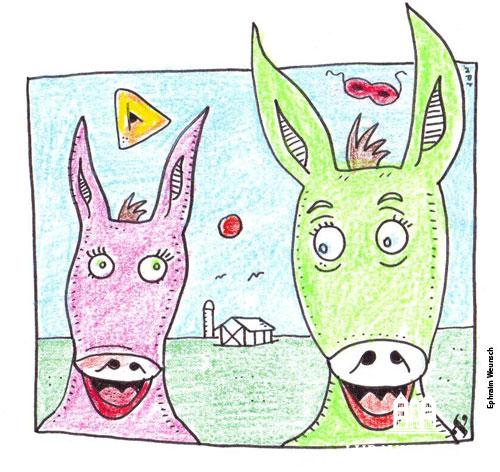(lubavitch.com) A donkey, her foal, and a pig lived in a barnyard. The foal complained to her mother that the pig was fed generously although it did nothing all day, while she and her mother worked hard all day bearing heavy burdens yet received more moderate amounts of food.
“Do not be jealous,” said the donkey.
“The pig is not being fed for its benefit, but in preparation for its downfall.”
Soon thereafter, the pig was slaughtered and served for the farmer’s holiday dinner.
The next day, when the farmer brought oats for the foal, the foal refused to eat.
“Foolish child. You need not be afraid to eat,” said the mother. “It is not eating that leads to destruction. It is sloth and uselessness that leads to destruction.” (Midrash Esther Rabbah)
The story of Purim is a story of masking and unmasking, of turning reality on its head, in which nothing is what it seems at first. The story starts with a party and an extravagant show of wealth and power in which a vain and arrogant queen loses her life and young Jewish girl is taken to the palace to serve in her place.
Through a string of events, Haman is elevated to a position of power. Yet Haman chooses to use his position to threaten the very existence of the Jewish people.
Esther now throws a party of her own in which she reveals her identity and proclaims Haman the enemy of her people. Subsequently, it is Haman who hanged on the very gallows he prepared for Mordechai the Jew, while Mordechai gains political influence which he uses to advocate for his people.
To this very day, Purim remains not just a day of celebration, but a day of sharing joy with others giving generously to the needy, sending gifts of food to friends, and joining together in a festive meal.
We Americans have long viewed our country as the land of our opportunity, and believed that honest work and hard labor will be rewarded. So the failure of our markets and the betrayal by members of the financial sector have hit us hard. We contrast the economic burdens carried by the average worker with the greedy consumption of those who have used their wealth and power to bring loss to so many.
In the face of our disillusionment, wiser voices remind us that we have no need to envy runaway profits and success—for unearned wealth sows the seeds of its own destruction.
Yet neither need we respond by turning our back on the economic arena, eschewing the opportunity for productive growth. It is not wealth nor power that is evil. In the hands of a Mordechai, they are tools of leadership and the means for positive transformation.Yet in the hands of a Madoff, they are magnets for misfortune. The man that might have been the agent of good, providing billions in philanthropic aid, has instead brought ruin to himself and those who looked up to him.
This Purim, let us adopt the wisdom of the donkey and not be distracted by the naivete of her foal. It is a day to take pleasure in the gifts that G-d has given us, and to look with optimism towards the year ahead. We need not cower from opportunities to rebuild and reinvest in our future. For while wealth for the wicked serves no purpose other than to fatten pigs for the slaughter, those who joyfully carry the load of communal responsibility have nothing to fear.
Purim Same’ach. May our fortunes all rise.

Be the first to write a comment.